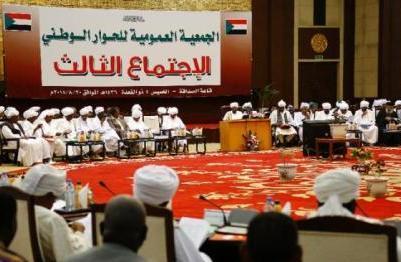Sudanese national figures seek to rally support for technocrat government
May 21, 2016 ( KHARTOUM) – A signatory member to the “National Initiative for Peace and Reform” in Sudan has revealed wide range of contacts with political forces, and the international community to support their proposal, which was handed over to the Presidency of the Republic.

The group of national figures said the memorandum has been handed over to the Presidency after a meeting between their representatives and the Minister of State at the Ministry of Presidential Affairs Fadul Abdalla on the 27th of March.
The memorandum calls to form a national government of well-experienced technocrats tasked to deal with pressing priorities and to solve big challenges facing the country.
The initiative has identified an eight point-agenda for action to be enforced during the transitional period, including: end of war, achieving peace, addressing the humanitarian situation, justice, reconciliation and peaceful co-existence, as well as tackling the issue of the International Criminal Court.
Speaking to a symposium held in Khartoum on Saturday, al-Tayeb Zain al-Abdeen, said the members of the initiative have made contacts with the National Umma Party (NUP), the Popular Congress Party (PCP), the Sudanese Communist Party (SCP) and Future Forces of Change (FFC), but failed to reach the ruling National Congress Party (NCP) and the Democratic Unionist Party (DUP).
“We have contacted civil society groups. The initiative was sent to the armed movements, the European Union, the African Union, the African Union High Level Implementation Panel, a senior US official (he did not identify) and to the Japan through its embassy in Khartoum,” he added.
Zain al-Abdeen described the dialogue as good despite the lack of comprehensiveness, adding that “in spite of the weak leverage of participants, they came out with good recommendations, against the wishes of the National Congress (Party), especially with regard to the issues of governance”.
However, he considered the recommendation related to the establishment of transitional government and doubling the seats of the parliament to represent all the participants in the dialogue as not practical.
President al-Bashir launched, in January 2014, a dialogue initiative that has been boycotted by main political opposition and armed groups. However, the dialogue process continued and ended up with recommendations which will be presented to the National Dialogue General Assembly, chaired by the president, for the approval.
The famous Islamic figure known for his opposition to the policies of the government and a co-signatory to the initiative, further questioned the commitment of the government to the outcome of the national dialogue, especially the recommendations on the security and intelligence services.
The National Dialogue Freedoms and Rights Panel has recommended cancelling and amending some articles of the national security and intelligence services act considering it as restrictive for freedoms and violating human rights.
Also it has recommended the cancellation of 25 article relating to surveillance, investigations, search operations and money seizure, and the article 50 empowering the security agents to arrest and detain people without a warrant.
Furthermore, the committee has recommended to amend article 52 on immunity, and article 83 so that the budget of the security service be subject to inspection by the Auditor General.
On his part, the PCP Political Secretary Kamal Omer has said the national figures initiative is not a valid alternative for the national dialogue, as the latter is deeper and more comprehensive than the former.
Speaking to the symposium, Omer said that President al-Bashir is committed to implement the outcome of the national dialogue, adding that he would not consider the initiative.
Omer went to criticize the opposition forces, saying they only agree on their hatred to the National Congress Party.
“The political crisis in the country is not a crisis of government but it is a crisis of opposition”, he said adding “one of the reasons behind the PCP decision to abandon the opposition ranks and to join the dialogue is the failure of the opposition forces to reach a joint platform”.
(ST)
